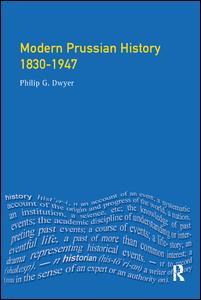Modern Prussian History: 1830-1947
Auteur : Dwyer Philip G.

- Contributions from leading authorities in the field.
- Broad range of themes make this an indispensable reference work.
- Text is supported by maps, illustrations and tables important data is easily accessible.
- Suggestions for further reading and research possibilities.
Date de parution : 06-2017
15.6x23.4 cm
Date de parution : 05-2001
Ouvrage de 336 p.
Thème de Modern Prussian History: 1830-1947 :
Mots-clés :
Young Men; east; GDR Historian; elbia; HMS Pinafore; state; State Secretaries; hans-ulrich; West Germany; wehler; Adolf Hitler; agrarian; Gerd Von Rundstedt; league; Prussian Landtag; frederick; East Elbian; william; German National People’s Party; german; Otto Von Bismarck; Catholics-Protestants tensions; Bismarck; labour movement; Bund Der Landwirte; Nazi Germany; Prussian History; Prussian militarism; Prussian Church; Prussian monarchy; Restoration Party; Prussian State Ministry; Agrarian League; Prussian Conservatism; Prussian National Assembly; Frankfurt National Assembly; Prussian State Government; Protestant Prussia; Church Provinces; Social Democratic Working Classes



